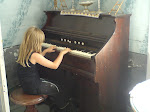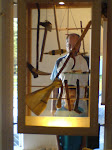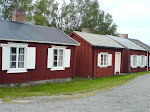A warm summers day like this I visited the woods near the small village Paharova in Norrbotten together with my maternal grandparents, my aunt Gerd, two female cousins in my age and their parents… For picking cloudberries where grandma probably had picked cloudberries and other berries when she grew up.
My grandma Hildur was born here October 13, 1894, as the tenth child in a family of sixteen children. Many of her siblings and their children and grandchildren still lived in this village and of course we visited them. Although I was 12, 5 years I don’t remember so much of these people or the village or houses. More of the berry-picking in the wood. My three year younger sister Elisabeth and our cousin Ulla got lost in the wood, but we found them, crying of course. Our parents were home in our home in the middle of the country, Elisabeth and I was alone in Norrbotten.
My great-grandparents Johan Petter and Erika Johanna got their first child Maria Henrika (called Maria) September 27, 1884, when they were 28 years. So they didn’t start early getting children!!
Johan Petter was born April 24, 1856 in a village called Norsijärvi (I think) and Erika Johanna was born June 15, 1856 in Kainulasjärvi. He died 1935 and she 1939, thus 79 and 83 years old!!! After having got 17 children up there near the Arctic Circle - amazing!
Their second child Alida was born a year later (I don’t know what month).
The first son was born Mars 17, 1887 Petter Hjalmar, called Hjalmar. Sons were more worth??
In this village there was only another family with as many children, but many of these children died in tuberculosis, noone did in grandma’s family!! Strange!
The children followed one after the other. November 5, 1888 Amanda Hilda Johanna (called Amanda), January 7, 1890 Johan Enok (called Johan), Mars 11, 1891 Albert Valdemar (called Valdemar), June 3, 1892 Oscar Villiam (called Oscar), June 29, 1993 Emil August (called Emil), Octiober 13 1894 Sofia Hildur (called Hildur, my grandma), December 2, 1895 Axel Hugo (called Axel), 1896 Josefina, 1898 Amalia Kristina (called Amalia), November 27, 1900 Anna Karolina (called Anna), ? Levi which died at birth, but was baptised, September 2, 1902 Mia Helena (called Mia) September, 1903 Alma Karin (called Karin) and last Albin Herman (called Herman) February 17, 1905.
Maria lived till 1969, got 10 children.
Alida lived till 1957 and got 14 children, of which five died before 10 years age, Hugo the first was born 1913 and died at six, Johan the next in line was born 1914 and died at four years, Ebba, the fourth in line was born 1917 and died 1921, Oskar the fifth in line born 1918, died 1926, Anna born 1919 died 1928. 8 of her children were dead 1987.
Hjalmar never married. Died 1979.
Amanda died 1969 and got 7 children, of which all got grown up, but many of them died fairly early.
Johan got 11 children, the last when he was 55 and his wife 50, he died 1965 and his wife died when she was 88! The second in line of their children Linnéa died as child, all the others grew up.
Valdemar only got 5 children but 24 grandchildren! He died 1966.
Oscar died 1969, got 8 children.
Emil never married, died 1965 when he was 72 only. He was one of the favourite uncles together with Herman.
Hildur my grandma got five children (the third Maj, died when she was two or three years). She got her first child when she was 31!! Her husband, my grandpa was then 25! She died on her 91 year, my grandpa got 87.
Axel got 8 children, all were married. He died 1975 at 80 years. His wife was 9 years younger.
Josefina married but didn’t get any children. Died at 59 or 60 years age?
Amalia got 10 children; all got grown up and married. She died when she was 70. Her first child was divorced!! There are hardly any divorces among all these people!!! She had 31 grandchildren!
Anna got well over 90 years. She got 7 children, the first when she was 30. She got 14 grandchildren as my grandparents.
Mia never married; she lived till she was 81.Was the favourite aunt!!!
Karin got 4 children, but 33 grandchildren. Karin was extremely god-fearing (gudfruktig in Swedish)! She married a three year younger man and got her first child when she was 37. Her oldest daughter got her first child when she was 16.
Herman married a fifteen year younger woman; they got their one and only child when he was 35 and she 20. She got tuberculosis and later and later a bleeding in the brain (an aneurysm).
My grandma was exactly in the middle, had 8 siblings before her and 8 siblings coming after her. They all went to school, but had to live apart from the family during the school-year. My grandma was in school for approximately six years! This surprises me!!
She did very well in school?? But said this was because she could "take" (i.e. "charm"?) the school-teachers. She was offered to studying singing in Stockholm by the county governor in Norrbotten who had heard her singing in Korpilombolo church. But she said later that she "didn't want to leave mom".
Their native language was Tornedal-Finnish even though they lived pretty far away from the border to Finland (lived near Gällivare I think ,for those who are Swedes) and certaunly were Swedes. But in the school they had to speak Swedish, they were even forced to do that? Grandmas oldest siblings never learnt Swedish though (didn't they go to school?), and her paernts never learnt Swedish either, so mom and her siblings couldn't communicate with them, and I doubt they would even if they had spoken the same language, an impression I have got from what I have heard and sensed.
And my mom hasn't met all her aunts and uncles and definitely not all her cousins, even though they all grew up in the same area (but bthen it was more tricky to travel too). This is extremely strange to think of, that such things aren't more far away in time!!
All (daughters?) got a heifer (kviga in Swedish) when they got married, so also my grandma. And she walked with this from her old home to the new, which meant a walk on 60-70 km (I chaged this August 6 from 30 to 60-70 km after having asked my mom about the distance)!!! Then she was pregnant but got an abortion, because of this walk??
How could her parents afford this: giving all their daughters this??
How was it with so many children and siblings? Too many children – not enough attention?
But my grandma wasn’t especially sensitive, very much in herself (lived in her demons? Which she never verbalised. Neurotic, ran to doctors, but was very healthy in fact? Ate a lot of pills all her life, despite this she got over 90 years)… Was very non-psychological. She ruled the household? My grandpa was a very quiet man, hardworking, but when he got angry he really got angry?
There is a picture in the family on my great-grandparents; my great-grandma a small, round old woman, looking a bit humbly onto the photographer, but I think she could say what she thought. When her daughters came home with their children and asked her as baby-sitter she refused with the words that she had her share of that or something like that!
Her husband almost one head taller on this photo! This photo is taken in front of a fence to a garden, a garden that doesn't look so barren surprisingly? But they were all small people, short!??
Spontaneously written...






























